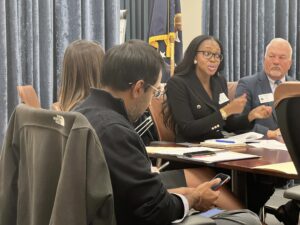On October 19, National Skills Coalition (NSC) and Jobs for the Future (JFF) hosted joint meetings with employers from NSC’s Business Leaders United (BLU) network and NSC network partners. Our shared goal was to educate federal policymakers from the Biden administration and from Capitol Hill about sector partnerships – what they are, why they’re important, how different stakeholders in a partnership work together, and how changes to sector partnership policies are critical to supporting employers’ skills-based hiring and talent needs.
In particular, the group focused on shining a light on the success of sector partnerships (for workers, business, and local economies) and advocating for making greater investments in sector partnerships when it comes time to reauthorize the Workforce Innovation and Opportunity Act (WIOA) or in other workforce legislation.
Five employers – and members of Business Leaders United – from the healthcare, manufacturing, and construction sectors – brought representatives from their sector partnerships to the fly-in, including representatives from community colleges and local workforce boards. Together, they met with staff from offices of more than 30 policymakers from key House and Senate committees and 20 policymakers from the White House as well as the Departments of Education, Labor, and Commerce.

Photo: Victoria Johnson moderates the event. Harin Contractor, Senior Policy Advisor at The National Economic Council in the foreground.
Featured photo at the top: Rohina Behrmann, Shelley Penn, and Lynette Wheeler during a break in the conversation.
A sector partnership is a collaboration of multiple employers with education, training, labor, and community-based organizations to address the local skill needs of a particular industry.
The group shared their experiences of developing (and expanding existing) sector partnerships and their sector-based training programs. Sector-based training programs are a proven way to address labor shortages and the skills mismatch that keeps their industries from hiring and keeps workers from accessing in-demand skills. These partnerships ensure training programs have capacity to close equity gaps in opportunities for training and skilled jobs that hold back people of color, women, and other underserved populations from landing in-demand, skilled jobs. The group also shared how workforce systems can partner and pursue new federal investments through the Infrastructure Investment and Jobs Act, CHIPS Act, and the Inflation Reduction Act.
Participants included
Victoria Johnson, Global Equity Director at HDR moderated the event. Johnson was also a participant on NSC’s Infrastructure Recovery Panel, a group of national business leaders, labor leaders, community college leaders, and industry training providers NSC convened to advise the Biden administration and Congress on federal recovery policies and initiatives to help workers and businesses adapt to structural shifts in their industries.
“It is so important for hospital executives to speak with policymakers and share the importance of industry partnerships that help us close the equity gaps in training our workforce,” said Lynette Wheeler, Chief Operating Officer, University Health Lakewood Medical Center in Kansas City, Missouri. “I have collaborated with Full Employment Council (FEC) of Kansas City, MO since 2015, which has allowed us to access available applicants to train for skilled hospital positions. We couldn’t do it without our FEC partnership.”
“The Boston MassHire Workforce Board jumped at the opportunity to connect with policymakers to discuss sector partnerships,” said Angela McCabe, Director, Workforce Development at MassHire Boston. “It is a strategy that’s absolutely critical to our Healthcare partners’ ability to hire, train and develop a workforce that fuels their essential operations. This was a chance to really impress upon the administration and Congress how valuable sector partnerships, like the Boston Healthcare Consortium, can be to our country’s talent pipeline and ensure these robust partnerships continue to be a focus of their workforce development plans and potential workforce legislation.”
It is a critical time to engage lawmakers on this issue. The rapid evolution of the economy – perpetuated by the pandemic – has resulted in major recent changes to the workforce. Sectors that were desperate to hire skilled workers prior to the pandemic are facing even greater need today. Yet, current policies don’t ensure enough workers have access to skills businesses looking for. This challenge is especially prevalent in the healthcare, manufacturing, and construction sectors.
One strategy to address the skills mismatch is to bring industry leaders, training professionals, educators / community colleges, and human service providers – within a local area and single industry – together in an industry sector partnership. Such partnerships are instrumental in supporting workers’ access to in-demand skills and businesses’ ability to inform and support the training that workers receive. Robust sector partnerships is an evidence-based strategy that leads to greater worker retention, wages, and stronger industry engagement with our public workforce and education systems.
Yet, in the current WIOA bill, although states and local workforce areas are allowed to use funds to support sector partnerships, there is no dedicated investment in them. This means the adoption and expansion of sector partnerships vary drastically from community to community – depending on state and local commitment, capacity, and expertise.
There is growing recognition from policymakers about the need to support and invest in sector partnerships. President Biden called for a $40 billion investment in his American Jobs Plan in 2020. The most recent WIOA reauthorization bill to pass through the House authorized $1 billion to provide funds for sector partnerships. There is bipartisan agreement from Senate leaders that this strategy should be included in any workforce legislation.
As of today, President’ Biden’s American Jobs Plan investments in ISP have not been implemented, the WIOA passed by the House is stalled, and the final version included a scaled back investment in ISPs than that original $1b, and the Senate has not advanced any meaningful workforce policy since WIOA has been up for reauthorization.
As Congress finishes their 117th session and looks towards 2023 and the 118th Congress, sector partnerships as part of skills-focused legislation will likely be a rare, but critically important place of bipartisan agreement. We look forward to working with our network, the administration, and Congressional champions to advance the landscape of these partnerships.